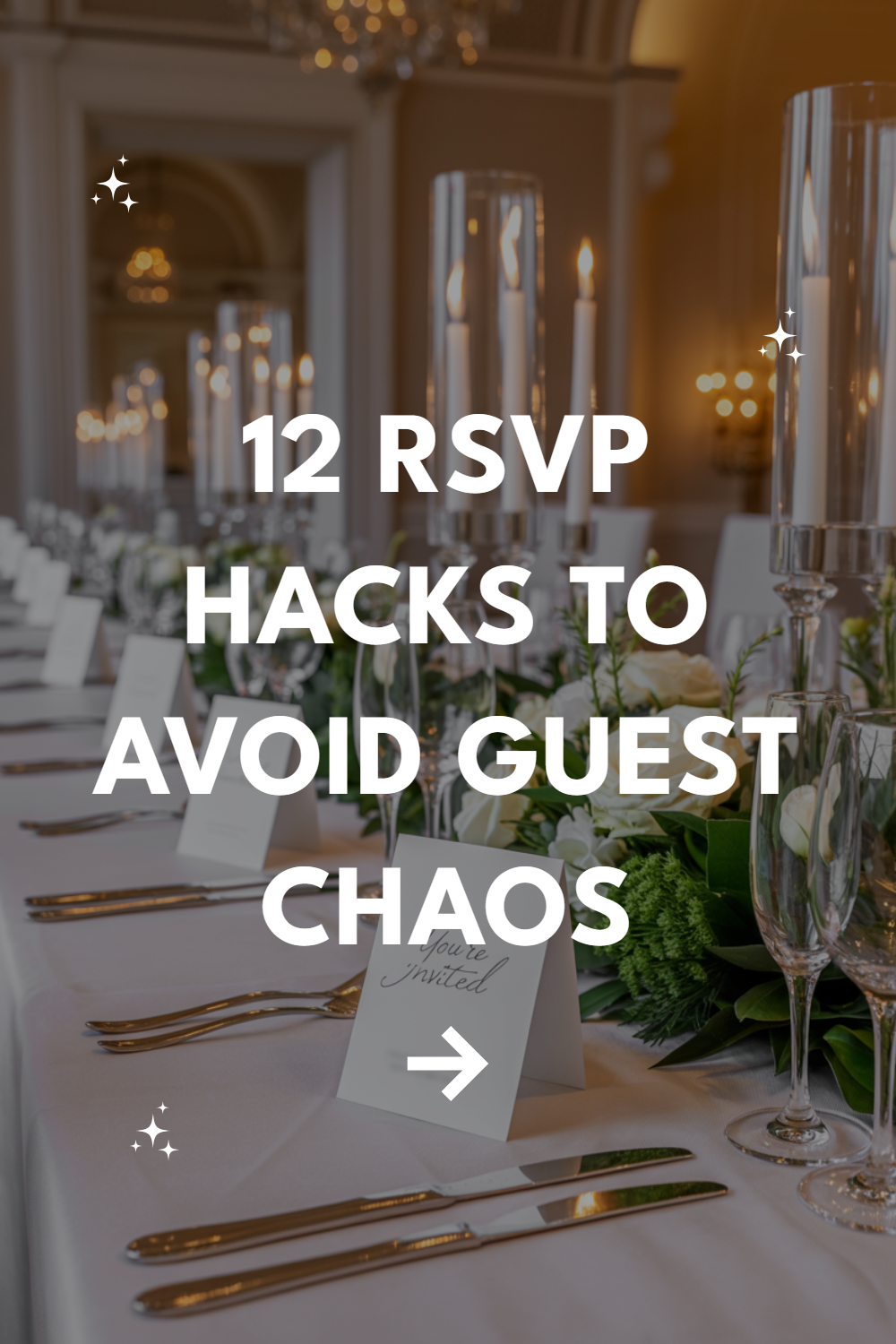RSVPs can make or break your wedding planning sanity. After watching countless couples spiral into guest-list madness, I’ve learned that the secret isn’t just asking people to respond—it’s making it impossible for them not to.
1. Set Your RSVP Deadline Earlier Than You Actually Need It
Here’s the uncomfortable truth: people will be late with their RSVPs no matter what deadline you set. Build in a two-week buffer between your stated deadline and when you actually need the final count.
This breathing room saves you from having awkward conversations with your caterer about last-minute headcount changes. Plus, you won’t spend your final weeks before the wedding chasing down stragglers while trying to finalize seating charts.
2. Make Response Methods Foolproof
Give your guests multiple ways to respond, but make each option crystal clear. Include a traditional response card with pre-addressed, stamped envelope alongside your wedding website RSVP option.
The key is removing every possible barrier to responding. When Aunt Martha can’t figure out your fancy website, she’ll grab a pen and mail the card instead of putting it off indefinitely.
3. Include Meal Choices on the RSVP Card
Skip the separate meal selection process entirely by incorporating food choices directly into your response system. List each option clearly with simple checkboxes next to guest names.
This eliminates the dreaded follow-up calls asking about dietary preferences. Your caterer gets the information they need upfront, and your guests handle everything in one go.
4. Create Urgency Without Being Pushy
Frame your RSVP deadline around a specific reason rather than just stating a random date. Try something like “Please respond by March 15th so we can finalize our celebration details.”
People respond better when they understand why their timely response matters. It transforms the deadline from an arbitrary request into something that feels important and considerate.
5. Use Strategic Wording for Plus-Ones
Be explicit about who’s invited to avoid the dreaded surprise guests. If someone gets a plus-one, address the envelope to “Sarah Johnson and Guest” or include their partner’s name if you know it.
For those flying solo, address only their name and include a line like “We’ve reserved one seat in your honor.” This eliminates any confusion about whether they can bring someone.
6. Follow Up with a Systematic Plan
Create a tracking system and stick to it religiously. Two weeks before your deadline, reach out to anyone who hasn’t responded with a friendly check-in text or call.
Don’t wait until the deadline passes to start following up. By then, you’re operating in crisis mode, and your stress levels will reflect it in every conversation.
7. Leverage Social Pressure Tactfully
Send save-the-dates and invitations to families together, but make it clear that each person needs to respond individually. This creates gentle accountability within family groups.
When one sibling RSVPs and mentions that their brother hasn’t responded yet, family dynamics often solve your follow-up problem for you. Just don’t rely on this entirely—some families are hopeless at internal communication.
8. Design Your RSVP Cards for Easy Processing
Use a consistent format that makes it simple to transfer information to your tracking system. Include spaces for full names, meal choices, and any special accommodations on the same card.
Consider using different colored cards for different events if you’re having multiple celebrations. This visual distinction prevents mix-ups when you’re processing responses quickly.
9. Set Up Automatic Reminders on Your Wedding Website
Most wedding websites offer automated reminder features. Set these up to send gentle nudges to guests who haven’t responded as your deadline approaches.
Technology handles the heavy lifting while maintaining a friendly tone. Your guests get reminded without you having to manually track and contact everyone individually.
10. Handle Non-Responders with Grace and Firmness
After your deadline passes, give stragglers exactly three days before you start making decisions for them. Call once, text once, then move forward with your planning.
Be kind but decisive in these conversations. Say something like “I need to give final numbers to our caterer tomorrow, so I’m hoping to hear back from you today.”
Most people will respond immediately when faced with a firm but friendly ultimatum.
11. Prepare Standard Responses for Common Situations
Draft template responses for typical RSVP complications before they arise. Have ready answers for last-minute plus-one requests, dietary restrictions, and accessibility needs.
This preparation prevents you from making emotional decisions when you’re stressed. You’ll respond consistently and fairly to similar requests instead of saying yes to some people and no to others based on your mood that day.
12. Track Everything in Real-Time
Update your guest list immediately when each response arrives. Don’t let RSVP cards pile up on your kitchen counter for a week before processing them.
Real-time tracking shows you exactly where you stand at any moment and prevents the overwhelming feeling of having a mountain of responses to process. It also helps you catch any issues or questions early while there’s still time to resolve them.
Creating Your RSVP Timeline
| Timeline | Action | Notes |
|---|---|---|
| 8 weeks before | Send invitations | Include clear RSVP deadline |
| 4 weeks before | Set RSVP deadline | Build in 2-week buffer |
| 2 weeks before deadline | First follow-up wave | Friendly check-in with non-responders |
| 3 days after deadline | Final follow-up | Firm but kind ultimatum |
| 1 week after deadline | Make executive decisions | Count no-responses as declines |
When All Else Fails
Some guests will always be impossible, and that’s not a reflection of your planning skills. Accept that 5-10% of your guest list might require direct intervention, and budget your time accordingly.
The goal isn’t perfection—it’s maintaining your sanity while getting enough information to throw a great party. Sometimes that means making educated guesses about the people who can’t seem to respond to a simple invitation, and that’s perfectly okay.


